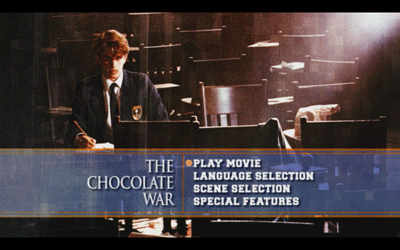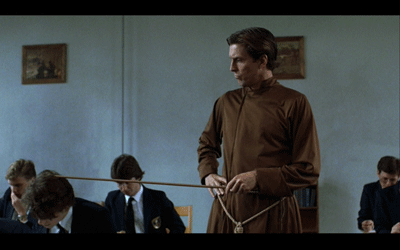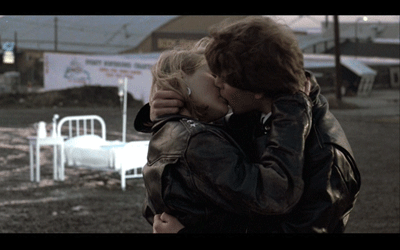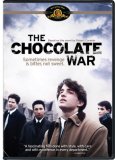| Reviews & Columns |
|
Reviews DVD TV on DVD Blu-ray 4K UHD International DVDs In Theaters Reviews by Studio Video Games Features Collector Series DVDs Easter Egg Database Interviews DVD Talk Radio Feature Articles Columns Anime Talk DVD Savant Horror DVDs The M.O.D. Squad Art House HD Talk Silent DVD
|
DVD Talk Forum |
|
|
| Resources |
|
DVD Price Search Customer Service #'s RCE Info Links |
|
Columns
|
|
|
Chocolate War, The
THE MOVIE:

Life for an adolescent can often seem surreal and disconnected from the world at large. This is why most teenage tales are about alienated kids searching for some kind of place where they fit, a niche within society that works for them. Of those stories, the ones that really run with the idea can be truly special, somehow finding the way to make all the abstract feelings of the high school years come into being as a physical state while still working metaphorically as mirrors to adult life.
Robert Cormier's The Chocolate War is a classic of young adult literature. I didn't read it as a teenager, I was already in college by the time I picked it up. I had seen Keith Gordon's film adaptation years before (it was released in 1988), so I had an idea what I was getting in for. Both the book and the movie impressed me by how they managed not to flinch. There's some dark stuff in The Chocolate War. It doesn't take any easy ways out or try to make everything too clean.
It's also kind of a weird story, establishing its own atmosphere. The environment of The Chocolate War is self-sustaining. The outside world rarely intrudes. The boys that go to Trinity Catholic High School come from all walks of life. It's not a private school for rich boys, but instead welcomes all students equally. Which isn't to say that it doesn't have its own hierarchy.
Every year, the Trinity boys are forced to sell chocolate to raise money for the school. This year, Brother Leon (John Glover, Smallville) raises the stakes, doubling the sales quota along with the price. He has his eye on the headmaster office, and so he demands each boy sell fifty boxes of candy, unloading 20,000 boxes and raising twice as much money for the school. To do this, he calls on Archie (CSI's Wallace Langham, then credited as Wally Ward), a member of the Vigils, a shadow society within the school. The Vigils secretly call the shots among the student body, summoning boys to dark meetings and giving them prank-laden assignments to perform. Consequences are never spoken of, the kids just step in line. Likewise, everyone sells the chocolate. Always.
Enter Jerry (Ilan Mitchell-Smith, Weird Science), a freshman whose mother has just died of cancer, leaving the boy in a sea of confusion even more tumultuous than the average pubescent. Looking for his niche within his new school, he tries out for the football team, even though he's probably too small to really make it. This brings him to the notice of Archie, who gives him the assignment of denying the chocolates for ten days. When those days pass, however, Jerry keeps refusing to sell, challenging the authority of the Vigils and the administration alike, disrupting the entire social order.
It's pretty easy to see Jerry's personal crusade as an existential rebellion. Even though his motives aren't even clear to himself, he chooses to stand alone and resist the tide pushing against him. His defiance puts Archie in a difficult situation, and to weasel his way out of it (Langham is superb at being weasely), the master manipulator turns the entire student body against the lone resister. The film makes Jerry's resolve seem reasonable by stripping it of all histrionics. He never makes a grand proclamation about why he's doing it, instead refusing to even talk about it, merely shrugging by way of explanation. The key scene comes early, though, when a punk rock girl (Jenny Wright) notices Jerry staring at her and her friends. She confronts him about it, and though he's too chicken to really talk to her, anyone that's ever been a teenager knows what the girl's appeal is. It's not sexual, it's about personality. She and her friends are not just outside of Trinity, but they stand on their own as a matter of course. They aren't scared of what other people think about them, they just do their thing.
The Chocolate War has a groovy, dream-like quality. Gordon regularly takes us into Jerry's head, showing him using daydreams and fantasies to work through his problems. He reaches out to his dead mother to try to figure out what she'd want, and then he switches roles between himself and other people in his life, looking for the proper position for each, restructuring the social environment. Though the topic of music never comes up, Gordon uses his soundtrack to full advantage, giving it an importance in the film akin to how important music can be in a young person's life. The employment of three Yaz songs in particular struck a chord with me. Jerry staring at himself in the mirror while "In My Room" and "Only You" play in the background isn't that far removed from my high school years.
Hell, it's not that far removed from my life now, which is why The Chocolate War still hits home. The thing about adolescent stories, about stories of identity, rites of passage, coming of age, be it Catcher in the Rye, Some Kind of Wonderful, or The Chocolate War, is that they aren't nearly as time specific as many would like to think. They aren't just about the teenage experience, ready to be filed away once we are done with childish things. We don't have to stop fighting for who we are just because we've grown up and moved out on our own and gotten a job. Those things actually push us harder toward conformity. The reason The Chocolate War remains resonant is that it makes us remember a time when we were naïve enough to believe in our own invincibility. At that age, when we push against the grain, we don't worry if it's going to push back. It's like when Jerry's friend Goober (Corey Gunnestad) tells him it's all going to be okay. Goober may not believe it, and he may not mean it in the way that Jerry takes it, but he's right.
It is all going to be okay. It's just sometimes we need to be reminded.

THE DVD
Video:
I've been waiting for The Chocolate War to come out on DVD for a while. It seemed perpetually delayed, and I worried it might get a half-assed release when it finally did come out. Thankfully, my fears were unfounded. The new widescreen (1.85:1) transfer is pretty sweet. The colors look really nice and the surface is free of flaws.
Sound:
We also get a really solid 5.1 mix, capturing the atmosphere of the school and the regular chatter of a group of teenage boys. Those great music cues are also piped through nice and loud. More importantly, listen to the silence. You'll rarely hear silence noted in an audio assessment, but there are some very important moments of silence in The Chocolate War, especially in the climax. Moments without sound need to come through as clear as moments with sound, and this DVD gets that perfectly.
English and Spanish audio tracks in mono are also on the disc, as well as subtitles in both of those languages and French.
Extras:
Writer/director Keith Gordon discusses The Chocolate War in a 51-minute, on-camera interview as well as a full-length audio commentary. He's a real chatterbox and manages to talk uninterrupted through both features without lagging. The interview is a little more broad, covering Gordon's rise through the cinematic ranks, acquiring the rights to Cormier's novel, casting, and production. A lot of the same material is covered in the commentary, but the director gets far more specific, dealing with different stories as particular scenes come up. He also gets more in-depth in the differences between the movie and the novel.
FINAL THOUGHTS:
No surprise here. The Chocolate War is Highly Recommended. This adaptation of the Robert Cormier novel is a coming-of-age tale unlike any other. Heartfelt writing and acting along with a unique setting and a surreal visual verve make it a film that stands apart in much the same way its hero tells us we can stand apart. Just as people need not be just another cog in the machine, so too can movies work out their own particular function in the great cinematic factory. The Chocolate War is one of the special ones. I'm so pleased to finally have a copy of my very own.

Jamie S. Rich is a novelist and comic book writer. He is best known for his collaborations with Joelle Jones, including the hardboiled crime comic book You Have Killed Me, the challenging romance 12 Reasons Why I Love Her, and the 2007 prose novel Have You Seen the Horizon Lately?, for which Jones did the cover. All three were published by Oni Press. His most recent projects include the futuristic romance A Boy and a Girl with Natalie Nourigat; Archer Coe and the Thousand Natural Shocks, a loopy crime tale drawn by Dan Christensen; and the horror miniseries Madame Frankenstein, a collaboration with Megan Levens. Follow Rich's blog at Confessions123.com.
|
| Popular Reviews |
| Sponsored Links |
|
|
| Sponsored Links |
|
|
| Release List | Reviews | Shop | Newsletter | Forum | DVD Giveaways | Blu-Ray | Advertise |
|
Copyright 2024 DVDTalk.com All Rights Reserved. Legal Info, Privacy Policy, Terms of Use,
Manage Preferences,
Your Privacy Choices | |||||||












